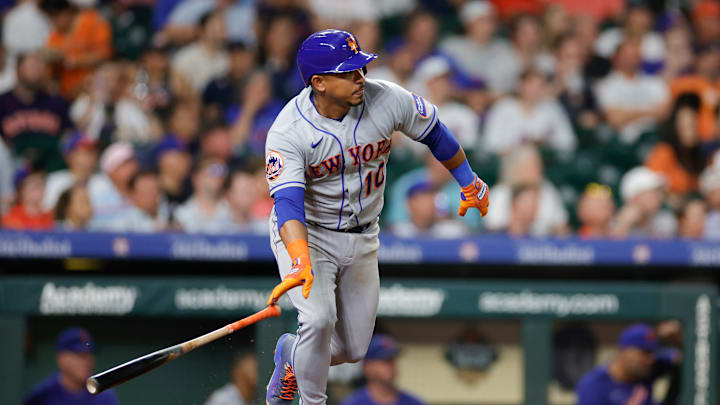Another day in no-man's land went down with the 2023 New York Mets on Friday, as their disappointing season continued with another nonchalant performance in Philadelphia on Friday night, but that wasn't the though on most people's minds in the Mets universe. That was because Mets sent their veteran infielder to the opposite corner of the country.
The Mets dealt Eduardo Escobar and cash to the Los Angeles Angels in exchange for pitching prospects Coleman Crow and Landon Marceaux. But what is more important here is that perhaps the Mets realized there was a big problem with their farm system that needed to be fixed.
The New York Mets seriously lacked pitching depth in their farm system, and Mets fans better hope this trade marks the beginning of them restocking their pitching cache in the minors.
The biggest pause for the 2023 Mets before the season began was that the lack of pitching depth, and inability to properly restock their roster with pitching replacements would not survive a 162 game season.
The Mets let three of their starters from last year walk in Jacob deGrom, Chris Bassitt, and Taijuan Walker (who threw six innings of one-run ball for the Phillies against his former Mets teammates in Friday's game). And they replaced them with Justin Verlander (missed a month to injury and has been inconsistent), Kodai Senga (better, but inconsistent too), and Jose Quintana, who hasn't thrown a pitch yet this season.
But the bullpen was the bigger red flag, especially with the sudden injury with Edwin Diaz leaving a gigantic cavity on the roster, and the Mets were still about two to three relievers short of a competent bullpen. And they've been exposed on that front over the past four weeks as the guys who have been coming up from the minors haven't offered the quantity and quality needed from major league relievers.
Who knows what will come out of this trade deadline season? The Mets' trade of Escobar should not be the sole indicator of where the Mets will go this summer, as it was much more the Angels' need of infield depth in response to the latest Anthony Rendon injury (left wrist contusion) and injecting offense to support Shohei Ohtani and Mike Trout.
But perhaps by adding two of the Angels' top 20 prospects, both pitchers into their farm system, the Mets may have realized that leaving the farm system shorthanded of quality pitchers with major league potential would leave behind crippling effects that would set the franchise back a few years that would need wholesale surgery instead of band-aids.
Building via pitching may not be Billy Eppler's forte, as he left the Angels in a pitching mess that took them multiple offseasons to rebuild, but this stretch of ineptitude from their pitching may have burst a bubble that needed to be exited.
And so far, we've seen why depth is so important. After killing it in Double-A this spring, Mike Vasil (the Mets' eighth ranked prospect according to MLB Pipeline) has made two starts in Triple-A, one of them good and one of them not-so-good. Vasil, realistically, might not make a significant impact on the big league roster until next summer.
Two of the team's three pitching prospects that are better. Blade Tidwell, the Mets' fifth-ranked prospect is only in High-A right now, although he's been killing it over his last six starts (1.32 ERA in 27.1 innings) and some believe he may move up to the next level before the season is up. And Calvin Ziegler, the team's seventh-ranked prospect, is sidelined with an injury, and played in Class-A last year.
Meanwhile, sixth-ranked prospect Dominic Hamel is already in Double-A, and has a xFIP of 3.70, according to FanGraphs.com, but he may not make it until 2024 or 2025, either.
Now the case of Coleman Crow and Landon Marceaux. Both pitchers are starters in Double-A, with one healthy (Marceaux) and another dealing with an elbow injury (Crow). Neither one wouldn't be ready for an impact on the team until next summer, unless they turn heads around the organization in Port St. Lucie next spring.
And with so many pitchers going down to injuries this year, and with a trend unlikely to turn unless teams change the way they coach their pitchers for the better in terms of long-term health, winning an organizational arms race is the way to go, especially for a Mets team that looks pretty set in postional player depth for a while.
